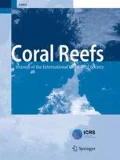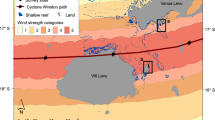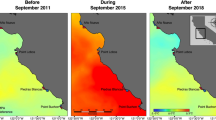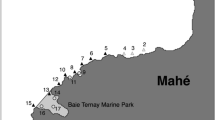Abstract
Poleward expatriation of tropical marine organisms is occurring globally, linked to climate change via strengthening of Western Boundary Currents (WBCs). In summer 2016, there was an unprecedented (in 18 years of monitoring) influx of coral-reef fish juveniles (“vagrants”) in temperate SE Australia. However, a large climate change-linked storm event (“East Coast low”) in June 2016 wiped out large numbers of these fishes over several days, as well as severely altering coastal habitat. Some taxa (e.g. Acanthuridae: surgeonfishes, key habitat modifiers) were decimated with up to 95% loss, while others (e.g. Pomacentridae: damselfishes, under 5% loss) fared better. The storm altered habitat (boulder “barens” were exposed by large-scale removal of macroalgae) with new barrens supporting over fifty times more tropical fish recruits in the following year (2017) than surrounding kelp-dominated areas. Fish were more vulnerable to storm effects in exposed habitats, and some species exhibited size-selective losses. Such climate-related storms can decouple links between poleward fish shifts and more predictable climate effects such as sea temperature rise.


Similar content being viewed by others
References
Andrew NL, Underwood AJ (1989) Patterns of abundance of the sea urchin Centrostephanus rodgersii (Agassiz) on the central coast of New South Wales, Australia. J Exp Mar Biol Ecol 131:61–80
Beck HJ, Feary DA, Figueira WF, Booth DJ (2014) Assessing range-shifts of. tropical reef fishes: a comparison of belt transect and roaming underwater census methods. Bull Mar Sci 90:705–721
Beck HJ, Feary DA, Nakamura Y, Booth DJ (2016a) Wave-sheltered embayments are recruitment hotspots for tropical fishes on temperate reefs. Mar Ecol Prog Ser. 546:197–212
Beck HJ, Feary DA, Fowler AM, Madin EMP, Booth DJ (2016b) Temperate predators and seasonal water temperatures impact feeding of a range expanding tropical fish. Marine Biology 163:2844–2888. https://doi.org/10.1007/s00227-016-2844-8
Booth DJ, Parkinson K (2011) Pelagic larval duration is similar across 23 degrees of latitude for two species of butterflyfish (Chaetodontidae) in eastern Australia. Coral Reefs 30:1071–1075
Booth D, Figueira WF, Gregson MA, Brown L, Beretta G (2007) Occurrence of tropical fishes in temperate south-eastern Australia: Role of the East Australian Current. Est Coast Shelf Sci 72:102–114
Booth DJ, Beretta G, Brown L, Figueira W (2018) Predicting Success of Range-Expanding Coral Reef Fish in Temperate Habitats Using Temperature-Abundance Relationships. Front Mar Sci. https://doi.org/10.3389/fmars.2018.00031
Chengjin CJ, plus 85 authors. (2018) Direct and indirect effects of climate on richness drive the latitudinal diversity gradient in forest trees. Ecology Letters 22:245–255
de Luca A, Evans JP, Pepler AS, Alexander LV, Aruesco D (2016) Evaluating the representation of Australian East Coast Lows in a regional climate model ensemble. J South Hemi Earth Syst Sci 66:108–124
Dixson DL, Abrego D, Hay ME (2014) Chemically-mediated behavior of recruiting corals and fishes: A tipping point that may limit reef recovery. Science 345:892–897
Feary DA, Pratchett MS, Emslie MJ, Fowler AM, Figueira WF, Luiz OJ, Nakamura Y, Booth DJ (2014) Latitudinal shifts in coral reef fishes: why some species do and others do not shift. Fish and Fisheries 15:593–615
Figueira WF, Booth DJ (2010) Increasing ocean temperatures allow tropical fishes to survive overwinter in temperate waters. Global Change Biology 16:506–516
Hobday AJ, Poloczanska EC, Matear RJ (eds) (2008) Implications of Climate Change for Australian Fisheries and Aquaculture: a preliminary assessment. Report to the Department of Climate Change, Canberra, Australia. August 2008
Hovick TJ, Allred BW, McGranahan DA, Palmer MW, Elmore R, Fuhlendorf S (2016) Informing Conservation by Identifying Range Shift Patterns across Breeding Habitats and Migration Strategies. Biodiv Cons 25:345–356
Jentsch A, Kreyling J, Beierkuhnlein C (2007) A new generation of climate change experiments: events, not trends. Front Ecoland Environ 5:315–324
Kohler KE, Gill SM (2006) Coral Point Count with Excel extensions (CPCe): A Visual Basic program for the determination of coral and substrate coverage using random point count methodology. Computers and Geosciences 32:1259–1269. https://doi.org/10.1016/j.cageo.2005.11.009
Louis S, Courie E, Lewis G, Glatz M, Kulmar M, Golding J, Hanslow D (2016) NSW East Coast low event- 3 to 7 June 2016 weather, waves and water level matters. NSW Coastal Conference Coffs Harbour http://www.coastalconference.com/papers.php
Pecl GT, Araujo MB, Bell J, Blanchard J, Bonebrake TC, Chen IC, Clark TD, Colwell RK, Danielsen F, Evengard B, Robinson S (2017) Biodiversity redistribution under climate change: Impacts on ecosystems and human well-being. Science 355:1–9
Smith SM, Fox RJ, Booth DJ, Donelson JM (2018) ‘Stick with your own kind, or hang with the locals?’ Implications of shoaling strategy for tropical reef fish on range-expansion frontline. Global change biology 24:1663–1672. https://doi.org/10.1111/gcb.14016
Soeparno S, Nakamura Y, Yamaoka K (2013) Habitat choice and recruitment of tropical fishes on temperate coasts of Japan. Environ Biol Fish 96:1–9
Sogard SM (1997) Size-Selective Mortality in the Juvenile Stage of Teleost Fishes: A Review. Bull MariSci 6:1129–1157
USGCRP (2017). Climate Science Special Report: Fourth National Climate Assessment, Volume I [Wuebbles DJ, Fahey DW, Hibbard KA, Dokken DJ, Stewart BC, Maycock TK (eds.)]. U.S. Global Change Research Program, Washington, DC, USA, 470 pp., https://doi.org/10.7930/j0j964j6
Vergés A, Steinberg PD, Hay ME, Poore AG, Campbell AH, Ballesteros E, Heck KL, Booth DJ, Coleman MA, Feary DA (2014) The tropicalization of temperate marine ecosystems: climate-mediated changes in herbivory and community phase shifts. Proceedings of the Royal Soc Lond B 281:20140846
Warton DI, Hui FK (2011) The arcsine is asinine: the analysis of proportions in ecology. Ecology 92:3–10
Acknowledgements
Thanks to fish surveyors, and Graham Pyke plus two anonymous reviewers for their reviews of the manuscript. This project was conducted under UTS Anima Ethics protocol 2012-433 ad NSW DPI Permit F94/696. DJB collected data, with Gigi Beretta, Will Figueira, Luke Brown, James van den Broek, Hayden Beck. DJB designed and executed this study and wrote the manuscript. This research was partly funded by the Australian Research Council.
Author information
Authors and Affiliations
Corresponding author
Additional information
Topic Editor Andrew Hoey
Publisher's Note
Springer Nature remains neutral with regard to jurisdictional claims in published maps and institutional affiliations.
Electronic supplementary material
Below is the link to the electronic supplementary material.
Rights and permissions
About this article
Cite this article
Booth, D.J. Opposing climate-change impacts on poleward-shifting coral-reef fishes. Coral Reefs 39, 577–581 (2020). https://doi.org/10.1007/s00338-020-01919-5
Received:
Accepted:
Published:
Issue Date:
DOI: https://doi.org/10.1007/s00338-020-01919-5




